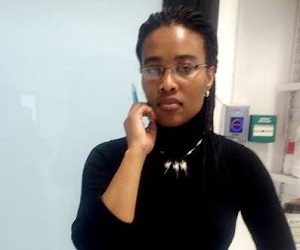How was life growing up?
Wow, where do I start! I grew up in a very big family of six kids, with my mom (Mamntlane) and my dad (Mbanjwa). I was fortunate enough to grow up with them and my grandparents. My father was a carpenter and every child of his had to know how to make a bench or a pelmet, at least. My mother was a domestic worker who loved children. She also taught at a pre-school. We literally worked from 6am to 6pm; before going to school we would read a book, and translate it from English to Afrikaans to Xhosa. When I went to high school, I found out that life is not about my mom and my dad and my siblings only.
Why did you choose this career?
As one says, it chose me. I initially wanted to be a medical doctor but that was not to be, as my marks were low and the University of Cape Town did not accept me. So I had to go with the second plan, which was to get my undergraduate degree from the University of Fort Hare and I ended up in science, but in a different profession.
What area of hydrogen and fuel cell technology do you specialise in and what does it entail?
Synthesis of Ni-doped LiMn2O4: the effect on Li-ion transport mechanism
High performance electrochemical energy systems, such as lithium ion batteries, are predicted to be the main drivers of next generation technologies needed for smart phones, cameras, laptops, electric cars and the efficient storage of solar and wind energy. South Africa is richly endowed with all the key mineral resources that can be used to manufacture these storage devices. My work is to develop a cathode material which will be used in these batteries.
Have you always wanted to be in science and, if not, how did you end up in science?
I count myself very blessed because, at that time, there were no TVs in our house in eLower Regu. When my father eventually bought one for us,I realised that I wanted to be a doctor from the movies I was seeing. When you are a scientist, you need time to be alone and think independently. I am the type of person who loves her alone time. I have also learned that there’s a hand all over what I do; someone bigger is watching over me and that someone is God.
What do you enjoy most about your job?
As a research scientist, I plan and carry out experiments and investigations to broaden scientific knowledge in a range of areas, from life sciences to industrial processes. Having an enquiring mind pushes me to be at the forefront of scientific discovery. Being good at solving problems, and collecting and interpreting data, I have learnt to have the patience and the persistence to carry on when you don’t get the results you expect.
Do you think South Africa is on par with the rest of the world with regards to hydrogen and fuel cell technology?
There is great potential for these technologies in South Africa. A driving force behind these technologies is the prevalence of platinum and manganese reserves found in South Africa. The hydrogen economy is under serious consideration in the country, in an effort to develop safe, clean and reliable alternative energy sources to fossil fuels. Hydrogen is an energy carrier and is used to store and distribute energy, and can be combined with the use of fuel cell technologies to produce electricity. Platinum group metals (PGMs) are the key catalytic materials used in most fuel cells.
Did you struggle to get funding and do you believe that there is enough support for students who are interested in science?
My father taught me this; money is not a problem when you need to do something extraordinary for yourself. It was for that reason he was never willing to pay any of our fees for university. We had to do it on our own, meaning we had to get good grades at school and make sure we passed at the end of the year. My parents were so amazing when it came to that (May they rest in peace).
What advice would you give young girls considering a career in science?
Luckily for me I work with women from the Eastern Cape and I am a board member of Women Empowering Women (WEWO). It is our mandate that we motivate girls and help them achieve what seems impossible for girls to achieve in rural areas. Because I am an opportunist, I always tell the girls to work hard at school and always choose maths and science because with those subjects you are set for life. Science teaches one about life in general and it disciplines you

Miss Niki Kunjuzwa was born in the Eastern Cape in Middledrift (eXesi) kwilali iLower Regu location. She completed her primary education at Lamani Lower Primary School and then attended high school in Cape Town at Sinethemba Senior Secondary.
Her secondary education was followed with a BSc from University of Fort Hare, and Honours and MSc in Chemistry from the University of Witwatersrand (Wits). Miss Kunjuzwa will soon be Dr. Kunjuzwa, as she is currently in the process of completing her PhD in Chemistry from Wits and the Council for Scientific and Industrial Research (CSIR).
